| Srl | Item |
| 1 |
ID:
128428
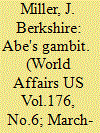

|
|
|
|
|
| Publication |
2014.
|
| Summary/Abstract |
China's aggressive actions in the East China Sea, combined with other factors, especially North Korea's continuing intransigence, have created an increasingly hostile security environment for Japan. Its response to these events can be seen in the impressive political rebirth of Shinzo Abe and the Liberal Democratic Party. While Abe, currently serving as prime minister for a second time, was elected largely because of his economic policies and the ineptitude of the formerly ruling Democratic Party of Japan, he has used his mandate to press forward with long needed, albeit controversial, defense and security reforms that indicate the seriousness with which Tokyo takes its current situation. With China looming up in front of them, and Pyongyang posing lesser but still worrisome threats, the Japanese have become acutely aware of the fact that their Self-Defense Forces (SDF) have one hundred and forty thousand ground troops, one hundred and forty-one maritime vessels, and four hundred and ten aircraft, while China's People's Liberation Army has one million six hundred thousand troops and North Korea has one million soldiers. Meanwhile, North Korea maintains a significant, if decaying, navy and air force, with one hundred and ninety vessels and approximately six hundred aircraft. China's much more capable maritime and air assets include nine hundred and seventy vessels and two thousand five hundred and eighty aircraft.
|
|
|
|
|
|
|
|
|
|
|
|
|
|
|
|
| 2 |
ID:
123363
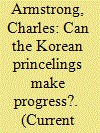

|
|
|
|
|
| Publication |
2013.
|
| Summary/Abstract |
North and South Korea's leaders are both scions of ruling families with a history of mutual hostility. Still, there is cause to hope that the South's Park Geun-hye will try what is long overdue: clear-headed, sustained engagement with the North.
|
|
|
|
|
|
|
|
|
|
|
|
|
|
|
|
| 3 |
ID:
162449
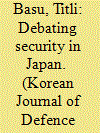

|
|
|
|
|
| Summary/Abstract |
Since the post–war era, understanding Japan’s security rhetoric and actions
presented certain incongruities. While the constructivist arguments underscore that
the influence of post–war antimilitarist norm shaped Japan’s security behavior, it
contradicts the realist underpinnings influencing Japan’s choices. To understand
Japanese post–war security orientation and comprehend the rapidly unfolding policy
shift, this paper explores three sets of questions: firstly, what are the competing
schools of thought in the Japanese security debate? What are their core arguments
on key issues including Article 9 of the Constitution, potency of the Self–Defense
Forces (SDFs), nature of the U.S.–Japan alliance and historical narratives of Japan’s
past? What are the inter-school and intra-school fault lines? Secondly, what are the
drivers that propelled the dominance of each school at different time frames? How
does the factional power struggle in the domestic political landscape enable each
school to maximize their space and influence in the current security discourse?
More specifically, why did mercantilists remained the dominant political force
throughout the Cold War? In contrast, what led to normalists gaining momentum
and substituting mercantilism as a potent force in the post–Cold War period?
Thirdly, how have political elites pursued their competing agendas and critically
analyze the case of Shinzo Abe? What are the influences that shaped his values?
What are the methods he employed to pursue his ambitions of making Japan a
“normal” nation? And how did he consolidate his political strength and manage to
realize concrete policy objectives?
|
|
|
|
|
|
|
|
|
|
|
|
|
|
|
|
| 4 |
ID:
160485
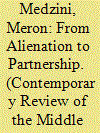

|
|
|
|
|
| Summary/Abstract |
The relations between Japan and Israel, established in 1952, can be divided into two periods. The first between 1952 and 1989 was known as the “the forty wasted years.” They were marked by chill bordering on alienation. The second began in the late 1980s and saw the flourishing of ties. Today, Japan–Israel relations are marked by much warmth and friendship at many levels. What were the causes for the Japanese policy in the early years and what factors led to the drastic change that occurred since then?
|
|
|
|
|
|
|
|
|
|
|
|
|
|
|
|
| 5 |
ID:
127158
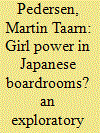

|
|
|
| 6 |
ID:
130631
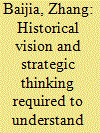

|
|
|
| 7 |
ID:
130627
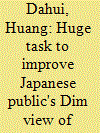

|
|
|
| 8 |
ID:
130624
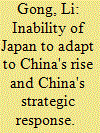

|
|
|
| 9 |
ID:
120892
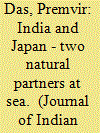

|
|
|
| 10 |
ID:
125976
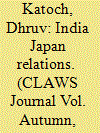

|
|
|
| 11 |
ID:
157564
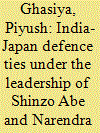

|
|
|
| 12 |
ID:
130616
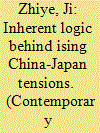

|
|
|
| 13 |
ID:
126845
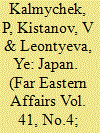

|
|
|
|
|
| Publication |
2013.
|
| Summary/Abstract |
The unstable situation in Japan's internal politics continued in 2012 and early 2013. Having come to power at the end of 2009, the Democratic Party was unable to keep its campaign promises and thus suffered defeat in the December 2012 parliamentary elections. The Liberal Democratic Party, once again in power, is also encountering a number of serious challenges in domestic and foreign politics. Prime Minister Shinzo Abe intends to bring the economy out of its prolonged stagnation, and to conduct a firm international policy that includes resolving territorial disputes with neighboring countries.
|
|
|
|
|
|
|
|
|
|
|
|
|
|
|
|
| 14 |
ID:
129290
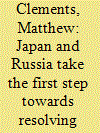

|
|
|
| 15 |
ID:
160482
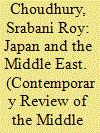

|
|
|
|
|
| Summary/Abstract |
As an introduction to this special issue, this article examines the shaping of Japan’s foreign policy; looking at how Japan has risen to the demand of the international community to assume more responsibility in conflict situations, circumventing a pacifist constitution that it had been dealt with. It then explains relations between Middle East and Japan and shows how the latter has been balancing its national interest in order to conform to its alliance with the United States. With more Asian powers having stake in the Middle East, Japan has become proactive about its role in the region. However, with limited hard power options, Japan would have to concentrate on its soft power capabilities and on using its economic strength to mark its presence in the Middle East.
|
|
|
|
|
|
|
|
|
|
|
|
|
|
|
|
| 16 |
ID:
160646
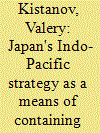

|
|
|
|
|
| Summary/Abstract |
This article analyzes Japan's policy in the basin of the Pacific and Indian Oceans. The term "Indo-Pacific Region" is more often used in scientific circles and mass media now instead of Asia-Pacific Region, which reflects the radical economic and political shifts in the basin of the two oceans. The Indo-Pacific strategy of Premier of Japan Shinzo Abe has an aim to contain the growing economic and military might of China - the main geopolitical rival of Japan in Asia. However, the implementation of this strategy faces difficulties.
|
|
|
|
|
|
|
|
|
|
|
|
|
|
|
|
| 17 |
ID:
144033
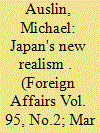

|
|
|
|
|
| Summary/Abstract |
Last September, tens of thousands of opponents of Japanese Prime Minister Shinzo Abe [1] gathered outside the National Diet building in Tokyo, often in torrential rain, holding placards and shouting antiwar slogans. They were there to protest the imminent passage of legislation designed to allow Japan’s military to mobilize overseas for the first time in 70 years—a shift they feared would undermine Japan’s pacifistic constitution and encourage adventurism. On September 17, Japan’s normally sedate parliament dissolved into scuffles as opposition politicians tried and failed to prevent a vote on the bills, which ultimately passed.
|
|
|
|
|
|
|
|
|
|
|
|
|
|
|
|
| 18 |
ID:
129074
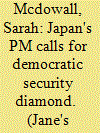

|
|
|
| 19 |
ID:
138091
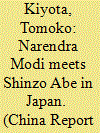

|
|
|
|
|
| Summary/Abstract |
2014 marked an important year for India–Japan relations. The most important events were the victory in the Indian general elections of Gujarat Chief Minister Narendra Modi of the Bharatiya Janata Party (BJP) and his visit to Japan. Japanese Prime Minister Shinzo Abe, who is widely known as a pro-India politician, had called up Modi soon after his victory and invited him to visit Japan. This invitation was warmly accepted by Modi and resulted in his visit to Tokyo and Kyoto from 30 August to 3 September. After the summit on 1 September, Modi and Abe announced the ‘Tokyo Declaration’ which declared ‘the dawn of a new era in Japan–India relations’ (MOFA, Japan 2014a).
|
|
|
|
|
|
|
|
|
|
|
|
|
|
|
|
| 20 |
ID:
126212
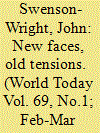

|
|
|